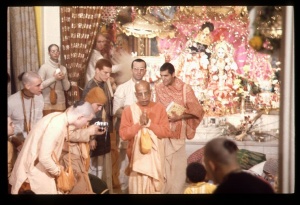CC Madhya 19.206: Difference between revisions
m (1 revision(s)) |
No edit summary |
||
| Line 1: | Line 1: | ||
{{ | [[Category:Sri Caitanya-caritamrta - Madhya-lila Chapter 19|C206]] | ||
<div style="float:left">'''[[Sri Caitanya-caritamrta|Śrī Caitanya-caritāmṛta]] - [[CC Madhya|Madhya-līlā]] - [[CC Madhya 19|Chapter 19: Lord Śrī Caitanya Mahāprabhu Instructs Śrīla Rūpa Gosvāmī]]'''</div> | |||
<div style="float:right">[[File:Go-previous.png|link=CC Madhya 19.205|Madhya-līlā 19.205]] '''[[CC Madhya 19.205|Madhya-līlā 19.205]] - [[CC Madhya 19.207-209|Madhya-līlā 19.207-209]]''' [[File:Go-next.png|link=CC Madhya 19.207-209|Madhya-līlā 19.207-209]]</div> | |||
{{CompareVersions|CC|Madhya 19.206|CC 1975|CC 1996}} | |||
{{RandomImage}} | |||
==== TEXT 206 ==== | ==== TEXT 206 ==== | ||
<div | <div class="verse"> | ||
uvāha kṛṣṇo bhagavān | :uvāha kṛṣṇo bhagavān | ||
śrīdāmānaṁ parājitaḥ | :śrīdāmānaṁ parājitaḥ | ||
vṛṣabhaṁ bhadrasenas tu | :vṛṣabhaṁ bhadrasenas tu | ||
pralambo rohiṇī-sutam | :pralambo rohiṇī-sutam | ||
</div> | </div> | ||
| Line 14: | Line 18: | ||
==== SYNONYMS ==== | ==== SYNONYMS ==== | ||
<div | <div class="synonyms"> | ||
''uvāha''—carried; ''kṛṣṇaḥ''—Lord Kṛṣṇa; ''bhagavān''—the Supreme Personality of Godhead; ''śrīdāmānam''—Śrīdāmā; ''parājitaḥ''—being defeated; ''vṛṣabham''—Vṛṣabha; ''bhadrasenaḥ''—Bhadrasena; ''tu''—and; ''pralambaḥ''—Pralamba; ''rohiṇī-sutam''—Balarāma. | |||
</div> | </div> | ||
| Line 21: | Line 25: | ||
==== TRANSLATION ==== | ==== TRANSLATION ==== | ||
<div | <div class="translation"> | ||
“‘When Kṛṣṇa was defeated by Śrīdāmā, He had to carry him on His shoulders. Similarly, Bhadrasena carried Vṛṣabha, and Pralamba carried Balarāma, the son of Rohiṇī.’ | “‘When Kṛṣṇa was defeated by Śrīdāmā, He had to carry him on His shoulders. Similarly, Bhadrasena carried Vṛṣabha, and Pralamba carried Balarāma, the son of Rohiṇī.’ | ||
</div> | </div> | ||
| Line 28: | Line 32: | ||
==== PURPORT ==== | ==== PURPORT ==== | ||
<div | <div class="purport"> | ||
This verse is from Śrīmad-Bhāgavatam ([[SB 10.18.24]]). When all the cowherd boys were playing in the forest of Vṛndāvana, the demon Pralambāsura appeared in order to kidnap Kṛṣṇa and Balarāma. The asura appeared disguised in the form of a cowherd boy, but Kṛṣṇa could understand his trick. Kṛṣṇa therefore divided all the cowherd boys into two parties. One party belonged to Balarāma, and the other party belonged to Kṛṣṇa Himself. Ultimately Kṛṣṇa was defeated in this play, and according to the wager, the defeated party had to carry the victorious party on their shoulders. Kṛṣṇa had to carry Śrīdāmā on His shoulders, and Bhadrasena had to carry Vṛṣabha. The demon Pralambāsura had to carry Balarāma, and when Balarāma mounted his shoulders, the demon ran far away. Finally the demon began to expand his body to a gigantic size, and Balarāma understood that he intended to kill Him. Balarāma immediately struck the demon’s head with His strong fist, and the demon fell down dead as if he were a snake whose head had been smashed. | This verse is from [[Srimad-Bhagavatam|''Śrīmad-Bhāgavatam'']] ([[SB 10.18.24]]). When all the cowherd boys were playing in the forest of Vṛndāvana, the demon Pralambāsura appeared in order to kidnap Kṛṣṇa and Balarāma. The ''asura'' appeared disguised in the form of a cowherd boy, but Kṛṣṇa could understand his trick. Kṛṣṇa therefore divided all the cowherd boys into two parties. One party belonged to Balarāma, and the other party belonged to Kṛṣṇa Himself. Ultimately Kṛṣṇa was defeated in this play, and according to the wager, the defeated party had to carry the victorious party on their shoulders. Kṛṣṇa had to carry Śrīdāmā on His shoulders, and Bhadrasena had to carry Vṛṣabha. The demon Pralambāsura had to carry Balarāma, and when Balarāma mounted his shoulders, the demon ran far away. Finally the demon began to expand his body to a gigantic size, and Balarāma understood that he intended to kill Him. Balarāma immediately struck the demon’s head with His strong fist, and the demon fell down dead as if he were a snake whose head had been smashed. | ||
</div> | </div> | ||
__NOTOC__ | |||
<div style="float:right; clear:both;">[[File:Go-previous.png|link=CC Madhya 19.205|Madhya-līlā 19.205]] '''[[CC Madhya 19.205|Madhya-līlā 19.205]] - [[CC Madhya 19.207-209|Madhya-līlā 19.207-209]]''' [[File:Go-next.png|link=CC Madhya 19.207-209|Madhya-līlā 19.207-209]]</div> | |||
__NOTOC__ | |||
__NOEDITSECTION__ | |||
Revision as of 03:21, 4 September 2021

A.C. Bhaktivedanta Swami Prabhupada
TEXT 206
- uvāha kṛṣṇo bhagavān
- śrīdāmānaṁ parājitaḥ
- vṛṣabhaṁ bhadrasenas tu
- pralambo rohiṇī-sutam
SYNONYMS
uvāha—carried; kṛṣṇaḥ—Lord Kṛṣṇa; bhagavān—the Supreme Personality of Godhead; śrīdāmānam—Śrīdāmā; parājitaḥ—being defeated; vṛṣabham—Vṛṣabha; bhadrasenaḥ—Bhadrasena; tu—and; pralambaḥ—Pralamba; rohiṇī-sutam—Balarāma.
TRANSLATION
“‘When Kṛṣṇa was defeated by Śrīdāmā, He had to carry him on His shoulders. Similarly, Bhadrasena carried Vṛṣabha, and Pralamba carried Balarāma, the son of Rohiṇī.’
PURPORT
This verse is from Śrīmad-Bhāgavatam (SB 10.18.24). When all the cowherd boys were playing in the forest of Vṛndāvana, the demon Pralambāsura appeared in order to kidnap Kṛṣṇa and Balarāma. The asura appeared disguised in the form of a cowherd boy, but Kṛṣṇa could understand his trick. Kṛṣṇa therefore divided all the cowherd boys into two parties. One party belonged to Balarāma, and the other party belonged to Kṛṣṇa Himself. Ultimately Kṛṣṇa was defeated in this play, and according to the wager, the defeated party had to carry the victorious party on their shoulders. Kṛṣṇa had to carry Śrīdāmā on His shoulders, and Bhadrasena had to carry Vṛṣabha. The demon Pralambāsura had to carry Balarāma, and when Balarāma mounted his shoulders, the demon ran far away. Finally the demon began to expand his body to a gigantic size, and Balarāma understood that he intended to kill Him. Balarāma immediately struck the demon’s head with His strong fist, and the demon fell down dead as if he were a snake whose head had been smashed.